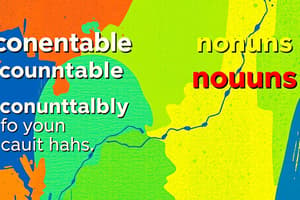Podcast
Questions and Answers
Which of the following is an example of an abstract concept that is uncountable?
Which of the following is an example of an abstract concept that is uncountable?
- Rice
- Happiness (correct)
- Furniture
- Water
Which sentence correctly uses an uncountable noun?
Which sentence correctly uses an uncountable noun?
- There is much information available online. (correct)
- I have several informations regarding the meeting.
- I need two pieces of luggage for my trip.
- Several pieces of furniture are for sale.
Which of the following quantifying expressions is correctly used with an uncountable noun?
Which of the following quantifying expressions is correctly used with an uncountable noun?
- many knowledge
- several advice
- a bit of sugar (correct)
- a couple of furniture
Identify the incorrect statement about uncountable nouns.
Identify the incorrect statement about uncountable nouns.
Which of the following sentences demonstrates the correct use of an uncountable noun?
Which of the following sentences demonstrates the correct use of an uncountable noun?
Flashcards are hidden until you start studying
Study Notes
Uncountable Noun Study Notes
Common Uncountable Nouns
- Substances: water, air, sugar, rice
- Abstract Concepts: happiness, information, knowledge, advice
- Collective Terms: furniture, equipment, luggage, clothing
- Natural Phenomena: weather, rain, sunlight, snow
Usage In Sentences
- Uncountable nouns do not have a plural form and are treated as singular.
- They often require a singular verb.
- Use "much" for questions and negatives (e.g., "How much water do we need?").
- Use "some" or "any" for affirmative and negative sentences (e.g., "I have some information.").
- When quantifying, use expressions like "a piece of," "a bit of," or "a lot of" (e.g., "a piece of advice").
Examples
-
Substance:
- Correct: "I need some sugar for the recipe."
- Incorrect: "I need two sugars for the recipe."
-
Abstract Concept:
- Correct: "Happiness is essential for a good life."
- Incorrect: "Happinesses are essential for a good life."
-
Collective Term:
- Correct: "There is a lot of furniture in the room."
- Incorrect: "There are many furnitures in the room."
-
Natural Phenomenon:
- Correct: "The weather is unpredictable."
- Incorrect: "The weathers are unpredictable."
Common Uncountable Nouns
- Substances like water, air, sugar, and rice cannot be counted individually.
- Abstract concepts include happiness, information, knowledge, and advice, representing intangible ideas rather than physical objects.
- Collective terms encompass furniture, equipment, luggage, and clothing, which are grouped together and considered singular.
- Natural phenomena such as weather, rain, sunlight, and snow also classify as uncountable nouns, describing elements of nature.
Usage in Sentences
- Uncountable nouns lack a plural form and should be treated as singular in context.
- A singular verb is used with uncountable nouns to maintain grammatical consistency.
- Employ "much" for questions and negatives (e.g., "How much water do we need?") to express quantity.
- In affirmative and negative sentences, "some" or "any" are appropriate (e.g., "I have some information.").
- Quantifying uncountable nouns can be done with phrases like "a piece of," "a bit of," or "a lot of" (e.g., "a piece of advice").
Examples Breakdown
- Substance Example: "I need some sugar for the recipe." is correct; "I need two sugars for the recipe." is incorrect as sugar is uncountable.
- Abstract Concept Example: "Happiness is essential for a good life." is correct, while "Happinesses are essential for a good life." is incorrect.
- Collective Term Example: "There is a lot of furniture in the room." is correct; "There are many furnitures in the room." is incorrect as furniture is uncountable.
- Natural Phenomenon Example: "The weather is unpredictable." is correct; "The weathers are unpredictable." is incorrect since weather is uncountable.
Studying That Suits You
Use AI to generate personalized quizzes and flashcards to suit your learning preferences.




